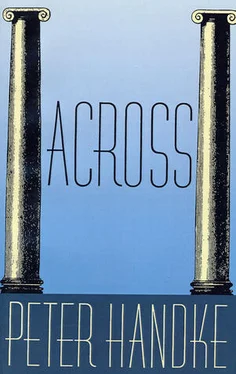Peter Handke - Across
Здесь есть возможность читать онлайн «Peter Handke - Across» весь текст электронной книги совершенно бесплатно (целиком полную версию без сокращений). В некоторых случаях можно слушать аудио, скачать через торрент в формате fb2 и присутствует краткое содержание. Год выпуска: 2000, Издательство: Farrar, Straus and Giroux, Жанр: Современная проза, на английском языке. Описание произведения, (предисловие) а так же отзывы посетителей доступны на портале библиотеки ЛибКат.
- Название:Across
- Автор:
- Издательство:Farrar, Straus and Giroux
- Жанр:
- Год:2000
- ISBN:нет данных
- Рейтинг книги:3 / 5. Голосов: 1
-
Избранное:Добавить в избранное
- Отзывы:
-
Ваша оценка:
- 60
- 1
- 2
- 3
- 4
- 5
Across: краткое содержание, описание и аннотация
Предлагаем к чтению аннотацию, описание, краткое содержание или предисловие (зависит от того, что написал сам автор книги «Across»). Если вы не нашли необходимую информацию о книге — напишите в комментариях, мы постараемся отыскать её.
Across — читать онлайн бесплатно полную книгу (весь текст) целиком
Ниже представлен текст книги, разбитый по страницам. Система сохранения места последней прочитанной страницы, позволяет с удобством читать онлайн бесплатно книгу «Across», без необходимости каждый раз заново искать на чём Вы остановились. Поставьте закладку, и сможете в любой момент перейти на страницу, на которой закончили чтение.
Интервал:
Закладка:
In crossing the thinly settled area, I met no one. Only once I saw someone on another path, and we greeted each other with upraised hats. On my way, I stopped into the Moos church, where services were in progress. Only a few people were there, at a certain point in the Mass, they gave one another their hands. Each of those present was expected to make a holiday wish. A woman with a polka-dotted head scarf said: “May Austria never die.” A young man said aloud: “May we become holy.” Two children looked at each other and grinned.
I left right after the blessing and went my way. The bog was rather bumpy in spots where peat had formerly been dug and which were now overgrown with grass. Here and there a patch of fallow land had been fenced off to form a community garden; from a gate that put one in mind of a ranch, a long, wide gravel path led to wooden cottages in the background.
The airport control tower, the tallest building on the whole plain, looked like an armless robot in the distance. I started toward it on a railroad track that came from the loading platform of a brewery. The warehouse was a long, yellow building with only blind windows in front. The sun shone on the great empty triangle and was reflected back. Momentarily overlapping, the shadows of two butterflies moved about on one of the blind windows as on a dance floor; the empty triangular space around them was a shimmering symbol of freedom. The railroad tracks in the meadow grass gave off a dazzling light. The ties forced me to take short steps like an old man; afterward, on the road, away from the tracks, I continued to move in their rhythm. A lone locomotive had once traversed this meadow, covered from roof to running board with homeward-bound workers.
The road enters a long tunnel which passes under the airport. Just before the tunnel, there is an athletic field, screened from view by a dense crowd, over which for a moment a white ball appeared. On a recurrent billboard, a blond woman posing in violet lingerie informed all comers: “These curves are for loving.” The highway was heavily traveled. Cars emerged from the tunnel with their headlights on; some turned them off at once, some a little later, some not at all. (“That’s the way we are.”) One car still had skis on top; the next, flowers; the third was already carrying a boat. A woman, perceptible only as a tapering hand on the wheel, held a long, skin-colored cigarette between her fingers and left behind her the image of a praying mantis. Utterly soundless in comparison to the crashing and honking on the ground, an enormous flying object, a commercial plane coming in for a landing, entered the air space above the endless column of vehicles. For a moment, it seemed motionless; only when it put down on the runway did it fill the countryside with its howling.
In the tunnel, the noise of the cars swelled to a roar and a blast, which passed through the portholes in the concrete wall and spread to the parallel foot and bicycle paths. A chain of fluorescent lights made the tunnel into a seemingly endless sequence of light and dark chambers, where pedestrians were by turns luminescent and invisible. The walls were covered with graffiti. The firstcomers had spread out freely, the rest had to squeeze in: Young man seeks young woman, view to sexual intercourse; Zion, devil’s-bread tree; Mother, your son is still walking under the sky; Kondwiramur. Two soldiers in caps and laced shoes saluted me in passing and called out: “Morning, Colonel. At your service.” Then came an unshaven man on a bicycle, who just said: “Hey, you.” (I, in turn, said to a woman who was running: “What’s the hurry?”) There was a cool, fresh smell in the tunnel. At the other end, it opened out to the west wind. The asphalt, pockmarked from stiletto heels and hobnails, looked, if you kept your eyes on it, like a dusty country road, spotted with raindrops.
Leaves blown in from outside showed that the tunnel was nearing its end. The section of landscape which came into view at the exit seemed suffused with a sort of transcontinental light. Here the Staufen is seen from a new angle; the accustomed pyramidal top breaks down into three broad humps, which draw the eye into the distance, and the gas stations, the warehouses, and the hangar begin to look like some sort of overseas settlement — in Tierra del Fuego or Montana.
The airport is correspondingly small, as if it were not part of the city but some sort of colonial branch office. The birches outside the terminal building were snow-white, and the luminous green of the young shoots of a larch tree seemed to fill the tree with tiny exotic birds. The stone rocket in the forecourt was replicated in the grass plot below it by a similarly shaped unopened crocus, whose dark violet emerged, ready for takeoff, from its silver-gray involucre.
Now it was midday and warm. Even the short wings of the ubiquitous sparrows sparkled in the sunlight whenever they flew up out of the hedges. From the fields adjoining the airport came waves of manure smell, and cows and pigs bellowed in the former Roman settlement of Loig, a little farther on. The straight line to the horizon drawn by the yellow laburnum bushes on either side of the highway was accentuated by the yellow of a gas station. As usual, I misread a “long-term parking” sign as “long-term farting.”
The air terminal building has two stories, surmounted by an observation deck. The second floor is occupied by a restaurant and a so-called hotel. This hotel consists of a short corridor with a few rooms on either side, so narrow that the two beds in it have to be placed end-to-end. In most of the rooms, the windows look out on the nearby control tower and the runways. Except in summer, the hotel is almost always empty; occasionally, a group will arrange for a banquet in the restaurant and book rooms in the hotel as well. There are no night flights.
The reception desk, behind a glass door that is always open, was, as usual, untended. I got the key from a waiter, whom I found in the terrace café. All the rooms were vacant, he informed me, and they were all the same. I wrote two names in the register: Andreas Loser and Tilia Levis. At least the waiter regarded the latter as a name, for he asked me: “Isn’t that an actress?” He had a bushy black mustache and said, without waiting for my answer: “Or an aviator? Or a foreigner? I’m from Kurdistan.”
It was cold and dark in the room; under the curtain rods and in the shower stall, the hum of fluorescent light. But when the window was open, warm spring air and quiet sunlight filled the room. The airfield didn’t seem to function at midday; there was only a helicopter flying back and forth, close to the ground as though looking for something, like a rescue craft over the ocean. Up in the glassed-in control tower, a man was sitting at the radar screen; he had his headphones on and he was reading the paper.
In the restaurant, I chose a table by the window, with a view of the western villages and mountains. In the middle of a fenced-in grass plot, a feathery brown spruce tree glimmered beside a chapel-blue fire hydrant. I ate light-colored lamb and drank burgundy, which in the bottle was as black as belladonna and in the glass barberry red — they brought out the colors of the landscape.
I spent the afternoon in the village of Loig, at the excavation site (which had been partly filled in). In the pits that were still open, children were looking for mosaic stones that might have been overlooked, and an elderly gentleman with chunks of clay clinging to the soles of his shoes — he had no doubt walked across the fields — was sketching the ancient water conduits in a notebook. A fruit tree, all pink-and-white blossoms, stood by itself in a muddy enclosure; a plump hen and a titmouse were perched on two branches, one above the other — living proof that such diversity of forms and species cannot be mere chance.
Читать дальшеИнтервал:
Закладка:
Похожие книги на «Across»
Представляем Вашему вниманию похожие книги на «Across» списком для выбора. Мы отобрали схожую по названию и смыслу литературу в надежде предоставить читателям больше вариантов отыскать новые, интересные, ещё непрочитанные произведения.
Обсуждение, отзывы о книге «Across» и просто собственные мнения читателей. Оставьте ваши комментарии, напишите, что Вы думаете о произведении, его смысле или главных героях. Укажите что конкретно понравилось, а что нет, и почему Вы так считаете.












